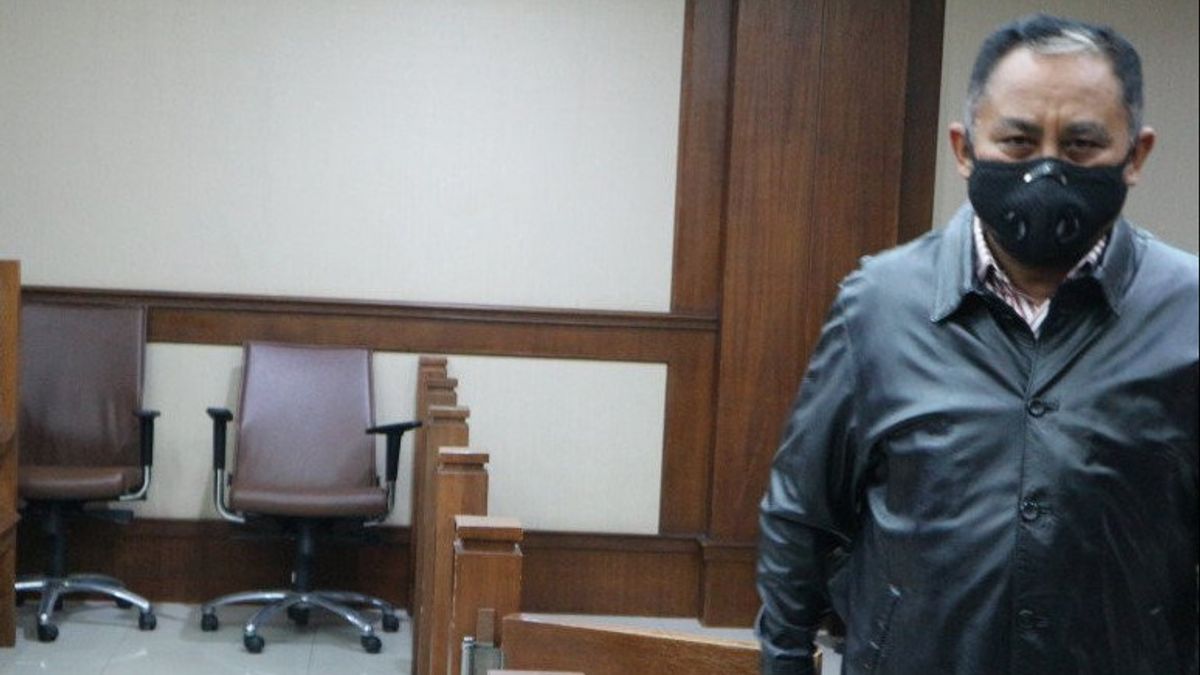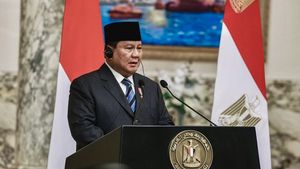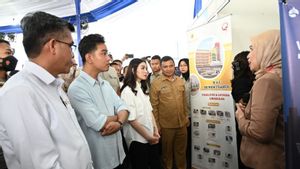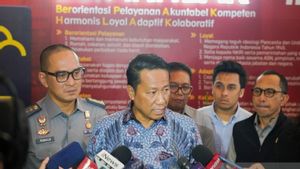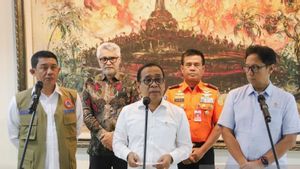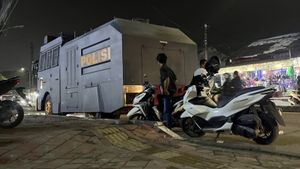JAKARTA - Convicted in the bribery case for handling beef imports at the Ministry of Agriculture and the criminal act of money laundering, Lutfi Hasan Ishaaq, filed a review (PK) to the Supreme Court.
Lawyer Lutfi Hasan Ishaaq who is also the former President of the PKS Prosperous Justice Party, Sugiyono said that the PK was proposed because he saw several new PK decisions.
"After serving 7 years of imprisonment, the petitioner found reasons for the judicial review panel to give an acquittal or lenient decision to the applicant on the grounds of mistakes and mistakes of the judge," said Luthfi Hasan's legal adviser, Sugiyono at the Jakarta Corruption Crime Court (Tipikor), reported by Antara. , Wednesday, December 16th.
Luthfi Hasan, who is currently serving a sentence at the Sukamiskin penitentiary, Bandung was directly present at the first hearing of the PK. He appears to be wearing a black jacket and black mask.
"After examining the 3 decisions, namely the PK decision on behalf of Irman Gusman, the cassation decision on behalf of Idrus Marham and the cassation decision on behalf of the applicant, the 3 decisions contained differences even though the three convicts were both accused of accepting something as state administrator with considerations not related to their authority. , "said Sugiyono.
It is known that the Supreme Court's panel of cassation judges in February 2019 cut the sentence of former Social Minister Idrus Marham from 5 years in prison and a fine of IDR 200 million subsidiary 3 months in prison to 2 years in prison in a bribery case related to the Riau-1 PLTU project.
Meanwhile in September 2019, the PK Mahmakah Agung assembly cut Irman Gusman's sentence from 4.5 years in prison plus a fine of IDR 200 million subsidiary 3 months imprisonment to 3 years in prison plus a fine of IDR 50 million subsidiary 1 month imprisonment in the case of receiving bribes related to imported sugar quotas at Perum Bulog .
According to Sugiyono, representing his client, the consideration of the cassation council and the PK council for Idrus and Irman stated that they were not proven to have accepted bribes.
"In his consideration, the judge said that Idrus and Irman's actions were not related to the scope of their authority which resulted in Idrus and Irman not being proven to accept bribes but receiving gratuities so that the decision of the cassation panel against the applicant was unfair and the applicant filed a PK," Sugiyono added.
According to Sugiyono, the basic mistake of the cassation judge against Lutfi Hasan is that the basic article of the decision has not changed, namely article 12 letter a of Law no. 31/1999 regarding the Eradication of Corruption Crime as amended by Law No. 20 of 2001 in conjunction with article 55 paragraph 1 to 1 of the Criminal Code.
"Even though the cases of Idrus Marham, Irman Gusman and the petitioner have similarities, namely that both state administrators have the authority in their respective fields, interact with the private sector and both have no authority in their positions," said Sugiyono.
According to Sugiyono, Idrus Marham is not authorized for electricity issues and Irman Gusman is not authorized to issue sugar import quotas, while Luthfi Hasan is not authorized for meat import quotas.
"The decisions of Irman and Idrus speak of direct money giving, but the applicant's decision did not mention direct acceptance from PT Indoguna Utama, but resulted in a different decision for Irman and Idrus changing from article 12 to article 11 on the contrary, the applicant remained at article 12 and from 16 years to 18. years with details of 10 years for corruption and 8 years for money laundering, "said Sugiyono.
For this reason, Sugiyono considered the decision stating that Lutfi Hasan was proven to have committed corruption was a decision that showed a real mistake and error.
"Namely the mistake of bringing together the facts and the law when the petitioning panel of judges stated that Article 12 was proven even though the provisions of Article 11 should have been applied, such as the PK panel Irman Gusman and the PK panel of Idrus Marham and the petitioner PK council had to cancel the previous verdict," said Sugiyono.
Regarding the money laundering case, Sugiyono assessed that the argued act of money laundering was not in accordance with the timing of the application of the TPPU Law.
"It is obligatory for the public prosecutor to detail the details of the crime that is suspected of being the 'predicate crime' of money laundering. The Petitioner considers that the judges of the district court and the high court do not fulfill the tempus delicti element of predicate crime so that it is only a conjecture," said Sugiyono.
The cassation decision in Luthfi Hasan's money laundering case is based on article 3 paragraph (1) letters a, b, and c as well as article 6 paragraph (1) letters b and c of Law no. 15 of 2002 as amended by Law no. 25 of 2003 concerning amendments to Law no. 15 of 2002 concerning the Crime of Money Laundering in conjunction with Article 65 paragraph (1) of the Criminal Code.
On 15 September 2014, the Supreme Court's panel of cassation judges led by the Head of the Supreme Court's Criminal Chamber, Artidjo Alkostar and members of the panel of Supreme Court Justices M Askin and MS Lumme decided to increase Luthfi's sentence to 18 years in prison and a fine of Rp1 billion, a subsidiary of 6 months in prison plus deprivation of political rights.
The cassation is heavier than the decision of the High Court on 25 April 2014 which only decided that Lutfi was sentenced to 16 years in prison with a fine of Rp1 billion, a subsidiary of 6 months in prison.
Meanwhile, in the first instance court ruling, Lutfi was sentenced to 16 years in prison plus a fine of Rp1 billion, replaced by 1 year imprisonment.
The English, Chinese, Japanese, Arabic, and French versions are automatically generated by the AI. So there may still be inaccuracies in translating, please always see Indonesian as our main language. (system supported by DigitalSiber.id)
